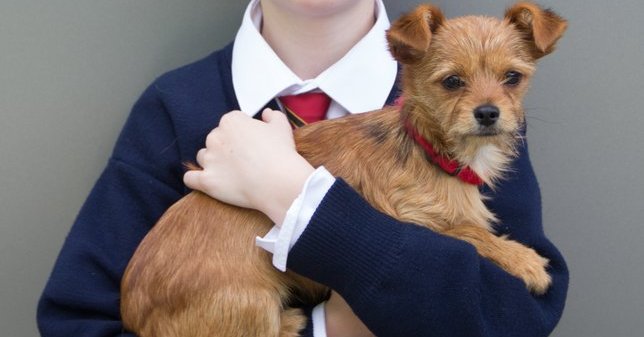
Mr T had been fully vaccinated, and he was thriving as a growing puppy. Then one evening last week, for no obvious reason, he developed diarrhoea. This is a common enough issue in puppies, and often it’s transient, returning to normal within 24 hours. However Mr T was not so lucky: the following morning, he vomited repeatedly and the diarrhoea worsened, turning a bloody red colour. Mr T refused to eat anything, staying huddled in his bed, unwilling to move. He was brought in to see me as an emergency.
As soon as I saw him, I could tell that he was dangerously ill. Small puppies are prone to becoming rapidly dehydrated, and a blood test confirmed the seriousness of this problem in Mr T. He had lost so much fluid in the diarrhoea and vomit that his body was beginning to shut down. Severe dehydration is well known as the cause of death in babies suffering from serious human diseases like cholera, and puppies are no different. Without rapid rehydration, Mr T’s life was at risk, and even with optimal intensive care, there was a chance that he might not survive.
I admitted Mr T to my clinic at once: he was placed in a warm cage, with an intravenous drip providing life-saving fluid straight into his circulation. Even though he had been vaccinated, Parvovirus was a serious concern: this virus often kills puppies of this age, and the signs are usually blood-stained diarrhoea and vomiting, just as Mr T was experiencing. It was a great relief when the test for this lethal virus came back as negative. There were many other possible causes of Mr T’s illness, including bacteria, parasites, toxins and allergic reactions, but none of them were as serious as Parvovirus would have been.
As well as being rehydrated, Mr T was then given treatment to cover all of the likely causes of his problem, including a thorough worm dose, antibiotic cover, and medications to stop any further vomiting or diarrhoea. He was slow to respond: for a full twenty four hours, he remained dull and sleepy, refusing to eat and continuing to suffer from vomiting and diarrhoea. I was worried that we might not be able to save his life.
At this point in the saga, Christian had to leave home to travel across Ireland for a school trip to the Gaeltacht: he had to say goodbye to Mr T, not knowing if he would ever see him again. It was a difficult time.
Thankfully, Mr T began to turn the corner the following day: his gastrointestinal signs dried up, and he showed some interest in nibbling small amounts of cooked chicken. He was then offered special bland tinned food which has been formulated to be highly digestible for dogs recovering from severe episodes of gastroenteritis. When he tucked into this hungrily, we knew that he was finally on the road to recovery. He went home with his little tail wagging, and a bright, cheerful spring in his step. He was a very different puppy to the sad, sleepy waif who had arrived a couple of days earlier.
When I saw him for a check up a few days later, he was completely back to normal, full of energy and enthusiasm like any normal six month old puppy. The cause of his illness remains a mystery: in most cases like this, vets classify the cause as “ideopathic”, which means “we don’t know”. The good news is that while the cause may remain unknown, we do know how to treat pups like Mr T. In most cases, once they turn the corner, the final outcome is a complete return to normal health for the long term. Mr T has made a full recovery.




Please note that I am unable to answer veterinary questions in comments. If you have questions or concerns about your pet's health it is always better to contact your vet.